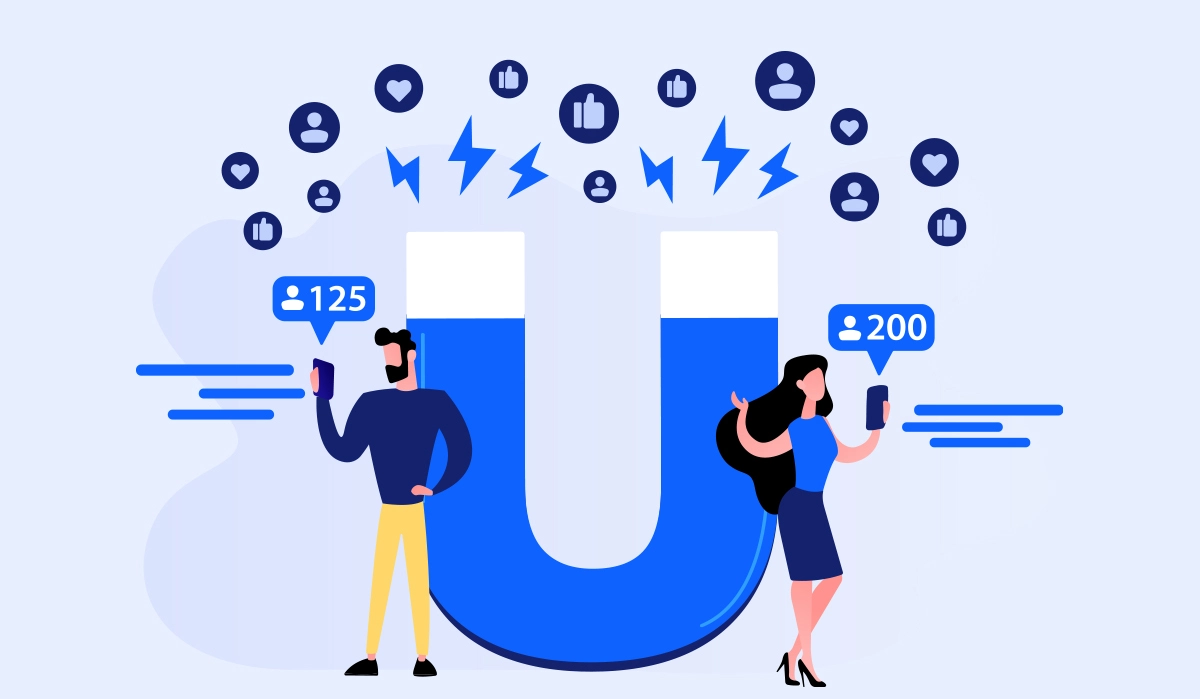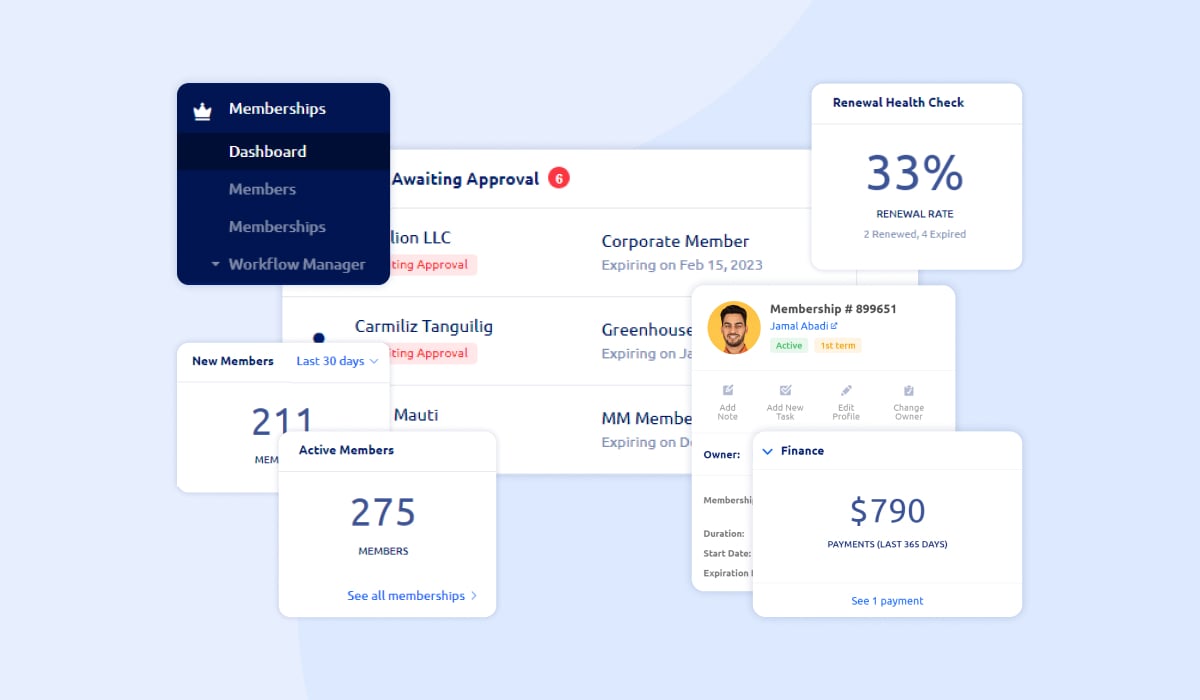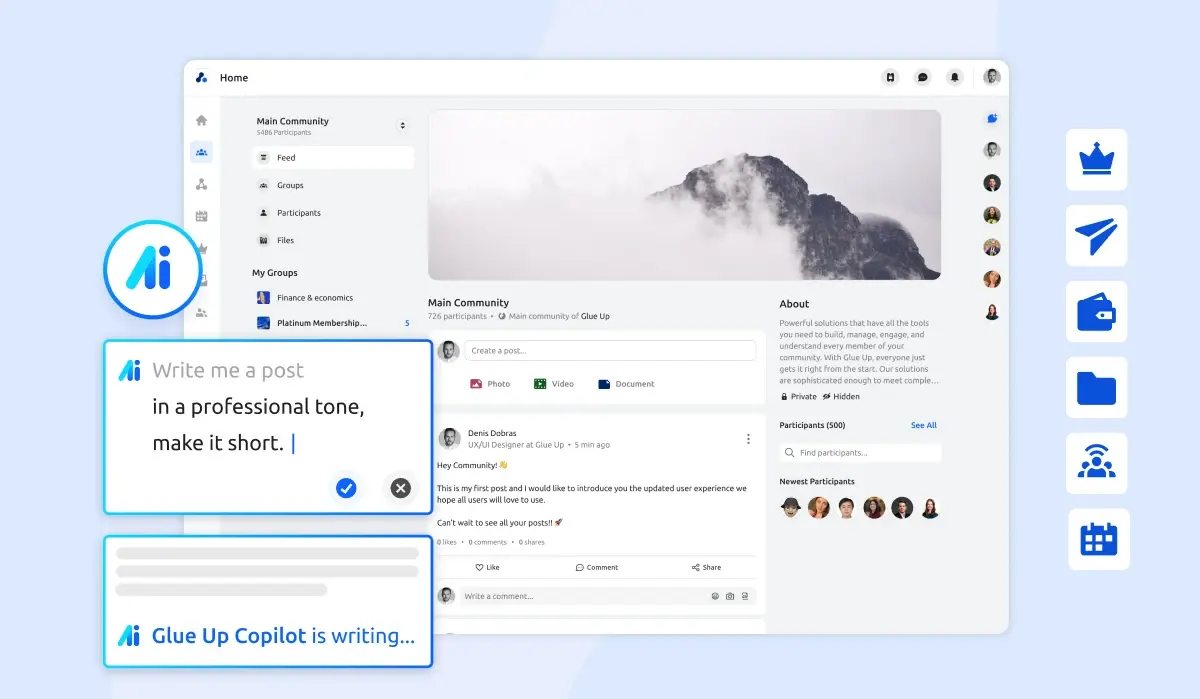![How to Create an Effective Membership Site Sales Funnel [ A Step-By-Step Guide to Successful Association Marketing with Tips, Tools, and FAQs] How to Create an Effective Membership Site Sales Funnel [ A Step-By-Step Guide to Successful Association Marketing with Tips, Tools, and FAQs]](/sites/default/files/2024-07/membership_site_sales_funnel_how_to_and_tips.webp)
Have you ever wondered why your prospects don’t convert into members despite your best marketing efforts? What’s stopping them from joining your association?
It is common for organizations to spend millions of dollars on membership drives and marketing channels to build awareness, yet they fail to develop a membership funnel that compels their visitors to click that subscribe button.
So what is a membership funnel and how to create one for your association?
We will answer both questions in detail in this step-by-step guide for creating an impressive conversion funnel for your association. We will also explore:
- 3 funnel steps of membership marketing
- 7 essential elements of a member funnel
- The most asked questions regarding the subscription funnel
So let’s dive in.
Key Takeaways
- A membership funnel describes the multi-step journey from the initial discovery of an organization to becoming a subscribed member and continues through onboarding and ongoing engagement.
- The three main stages of a membership funnel are Build Awareness, Spark Interest, and Convert Leads into Members. Each stage involves specific strategies and tools to move prospects closer to joining.
- Seven essential components of an effective membership marketing funnel include landing pages, lead magnets, opt-in forms, thank you pages, email marketing, sales pages, and membership management tools.
- Email marketing is particularly effective for lead nurturing, with a suggested sequence of five emails sent every other day to guide prospects toward membership signup.
- The funnel doesn't end at signup - onboarding and ongoing engagement sequences are crucial for retaining members long-term and encouraging active participation in the organization.
What Is a Membership Funnel?

The word membership funnel is the association’s version of the conversion funnel.
It describes the multi-process journey of your members from the moment they discover your organization to the point where they subscribe to your membership.
Unlike the sales funnel, the membership funnel doesn't end when a person buys your membership. Rather, it goes on, from effective onboarding to providing an exceptional member experience with a goal of creating long-lasting engagement with them.
To understand the funnel correctly, let’s explore all its 3 stages in detail.
Stage 1: Build Awareness
A membership marketing funnel starts when someone discovers your organization for the first time. It may be their first time visiting your website, reading your social media post, or hearing about you.
At the awareness stage, the goal is to pique visitors' interest enough for them to sign up for a valuable free resource in exchange for their contact information (most importantly their email address). Furthermore, it collects your visitors’ data to identify the target audience and your buyer’s persona.
The following strategies will help you pass a great chunk of the customers in your awareness funnel to the next stage:
- Set a clear message and mission for your brand.
- Determine who your ideal customer is and what their demographics are.
- Make sure your messaging clearly describes the problem you are solving with your product or service.
Once you implement these strategies, start with an awareness campaign.
Awareness campaigns are focused efforts to increase the visibility of your organization to your target audience.
For impactful awareness campaign content, try to leverage the purpose of your association.
As an example, if your organization focuses on sustainability, you can promote a social media campaign on Earth Day to reduce carbon footprint.
You can take advantage of trends to put your organization or membership site in the spotlight when it is relevant. Other methods like virtual summits, webinars, and social media promotion also help in grabbing people’s attention.
Once you've created an impactful awareness campaign, promote it through the most effective media. To sum up, here is a list of all the ways to build your brand's awareness:
- Membership site
- Social media posts (LinkedIn, Facebook, Pinterest, and Instagram)
- Search Engine Optimization
- Paid digital ads (Search, Display, and Video ads)
- Affiliate marketing
- Print and radio ads
- Videos
- In-person events
Stage 2: Spark Interest

After you get your visitors’ attention, it's now time to motivate them to consider buying your membership. This can only happen if you have an effective sales funnel website that converts your prospects’ curiosity into genuine interest.
Once someone clicks on your ad (social media post, organic results, or paid ad), they land on a specific page of your website which is known as a landing page. Visitors are more likely to stay on your website if your landing page is engaging.
According to the experts, you only have around 20 seconds to catch your website visitor’s attention. Thus, make sure you follow these steps to receive maximum leads:
- Communicate clearly about your association, and what your purpose and benefits are.
- Offer them valuable resources in the form of lead magnets. (explained below)
- Develop email marketing campaigns to convert leads into members. (explained below)
Note that this stage does not aim to convert your visitors into members right away. Rather, it is intended to entice visitors to subscribe to your newsletter.
In the next stage, these leads are then converted into members using email marketing.
Stage 3: Conversion
Lead nurturing is the third phase of the member funnel. Leads are people who have expressed interest in your organization and whose contact information you have. Email marketing works well for them since you need minimal effort to get them to take action.
After you've created your email list, you can issue a newsletter, which is a great way to cultivate leads in your association members.
Three elements are critical for making your newsletters successful:
- Content - Should be small yet impactful
- Timing - Too many emails may appear as spam
- Subject line - Should be compelling enough to increase open rates
Don’t overwhelm your audience with too many emails as it will only lead to unsubscriptions and diminish their interest in joining. Start by sending one email per week. This schedule is a good balance between over and undersending.
After receiving a good response (in terms of open rates and click-through rates), you can increase the frequency to two emails per week.
Creating a Membership Marketing Funnel: 7 Essential Components
Landing Page
A landing page is the first step of your marketing funnel. Visitors arrive at your landing page via a paid ad, a referral link, an organic search result, or a social media post.
The main goal of this page is to convert your cold traffic into a lead i.e. to urge your visitors to take an action on your website such as signing up for your emails or downloading a freebie.
Your landing page should include the following features to generate successful leads:
- Mobile-friendly
- Distraction-free
- Minimum or no promotive content
Your goal at this stage of your marketing funnel is to pique your visitor's interest so that they will hand over their email addresses to get the valuable resources you are offering.
That being said, try to make your landing page user-friendly. You can also try A/B testing to see which texts work best for specific audiences.
Lead Magnet

Lead magnets are free resources given away to website visitors in exchange for their contact information.
Ensure that the lead magnets you create are extremely valuable so that your prospects are compelled to provide their email addresses to be able to access them.
Here are some examples of lead magnets that will engage prospects and keep them coming for more:
- Trial subscription
- Samples and templates
- Worksheets
- Webinars
- Video training series
- Social media challenges
You might also offer a free trial of your membership as the lead magnet if you have a lot of valuable videos or downloadable content. People will want to remain on board to keep access to all your resources.
Again, you should check what works best for your audience via A/B testing.
Opt-in Forms
To create a landing page that gets website visitors onto your email list, you may actually want to have several different types of opt-ins throughout your site, for example:
- Opt-in box on a content page
- A popup on the homepage
- An opt-in form on the sidebar
To create an opt-in form, you simply need to add a code on your sales funnel page that allows people to sign-up. However, if you want to make these forms fancier, you can use some opt-in forms software like Clickfunnel.
The software allows you to set up a variety of opt-in forms quickly and easily, and there are templates you can use to make it even easier to create a good-looking form.
Thank You Page
A Thank You Page, also known as the confirmation page, is where your visitors land after they fill out a certain opt-in form on your website, for example, signing up for your newsletters, downloading an ebook, or requesting a demo.
It is a way to acknowledge their time spent exploring and taking an action on your website. In addition, this is a great place to implement a tripwire strategy.
A tripwire strategy offers low-cost products at reduced prices, at a cost much lower than their true value. This offer demonstrates value to your visitors (for example, a low-cost membership trial) thus increasing your chances of making recurring sales.
As a result, it provides you with an opportunity to obtain customers early on in your website funnels, making it easier for you to sell to them later on.
Email Marketing Funnel

As per the latest survey, email marketing generates 4.24% of sales, compared to search engine traffic and social media traffic at 2.49% and 0.59%, respectively.
Once you accomplish the goal of getting leads from the landing pages, you will need to build an ongoing relationship with your prospects and move them further down the funnel through email marketing.
When your leads fill out the opt-in form, you should send them an email in which your lead magnet is delivered, welcoming them to your community. If you have a double opt-in setup, your prospects will receive a confirmation email first, asking them to verify their email addresses.
Ideally, your email marketing funnel should have five emails, sent out every other day. It should include an informative guide along with compelling and time-sensitive reasons to sign up for your membership. Additionally, you can offer an expiring coupon to create urgency.
Sales Page
The next in the funnel is the sales pages. Once your leads click the CTAs from your emails, they are directed to the sales pages.
At this stage, you will have two types of leads:
- Type 1 - That are willing to buy immediately
- Type 2 - Those who are piqued enough to click through but need more information before they signup for your memberships
For type 1, you should place a clear CTA placed above the fold on the sales pages that says Buy Now.
To persuade type 2 to complete their purchase, make sure you include detailed information on the page with further CTAs to contact your customer executives.
Membership Tool for Smooth Onboarding

The membership site itself is another important component of your membership marketing funnel. A clear website with an easy application process increases the number of memberships to a great extent.
In the membership marketing funnel, this is a high-value touchpoint, especially if they have purchased a tripwire offer.

Glue Up’s all-in-one engagement management CRM offers an exceptional onboarding experience to your members.
You can sync your website with the cloud software that facilitates the entire signup process. From detailing each tier to filling up the application form, you can automate every step using the platform.
Since your website is integrated with the software, all the subscription requests and payments go directly into the database. This also sends your members an automated welcome email to your new members, improving their overall experience.
Onboarding Funnel
Membership funnels cannot be complete without a good onboarding experience. It is one of the final phases of the membership communication funnel and has the ultimate goal of increasing member engagement.
As your onboarding funnel and membership site engage more members, the more likely you are to retain them long-term, leading to association growth (both in terms of members and revenues).
Additionally, it highlights the special aspects of your memberships that differentiate you from your rivals and encourage your members to stay with you.
A great way to create a successful onboarding funnel is to automate it using membership management software that offers a personalized experience to your members.
Moreover, it gives them the flexibility to revisit onboarding at any time if they haven't logged in for a specific period or haven't achieved their goals.
Engagement Sequence

Your membership marketing funnel concludes with your engagement sequence.
Your goal here is to ensure your members engage with your content throughout their membership lifecycle, not just during the onboarding process.
Through Glue Up's membership management software, you can create a powerful engagement sequence, by:
- Create and send engaging emails using the drag and drop model.
- Sending automated emails, push notifications, and renewal reminders through a centralized membership database.
- Providing analytics to gauge engagements score.
- Creating impactful event landing pages for maximum conversions.

Moreover, you can bring your community together using Glue Up’s private community management modules. This platform is specially designed to enable business networking, helping you achieve your long-term goals of member engagement.
Would you like to know how Glue Up website solution can help your association achieve member engagement goals and build a solid sales funnel? Book a demo now and we’d be more than happy to assist you.
How to Build a Membership Funnel?
A well-structured funnel not only attracts new members but also nurtures them into loyal advocates. Here’s how you can effectively build a membership funnel for your association.
Identify Your Customer Persona for Your Membership Site
Before you can effectively attract new members, you need to know who you're targeting.
Start by creating detailed customer personas that represent your ideal members. Consider their demographics, professional backgrounds, goals, challenges, and motivations.
- What value do they seek from an association like yours?
- What keeps them up at night?
The more specific you can be, the better you'll be able to tailor your messaging and offerings. Don't rely on assumptions – conduct surveys, interviews, and focus groups with your current members and target audience.
Use this data to build comprehensive profiles that will inform all your marketing and membership strategies.
Generate Leads
With your personas in hand, it's time to cast your net and attract potential members. Develop a multi-channel approach to lead generation that aligns with where your target audience spends their time.
This might include:
- Creating valuable content such as blog posts, whitepapers, or webinars that address your personas' pain points
- Optimizing your website for search engines to increase organic traffic
- Leveraging social media platforms to share insights and engage with your community
- Attending industry events and conferences to network and showcase your association's value
- Running targeted online advertising campaigns
Remember, the goal at this stage is to capture contact information. Offer something of value – like an exclusive report or free consultation – in exchange for an email address or phone number.
Nurture Your Leads
Once you've captured leads, don't rush to push for membership immediately. Instead, focus on nurturing these relationships.
Develop an email marketing sequence that provides value and builds trust over time. Share success stories from current members, offer sneak peeks into exclusive resources, and demonstrate how your association solves common industry challenges. Personalize your communication based on the lead's interactions with your content. If they've shown interest in a particular topic, send them more information in that area.
The key is to stay top-of-mind and consistently reinforce the benefits of joining your association.
Convert Leads Into Members
As your leads warm up, it's time to make your pitch.
Create compelling membership offers that speak directly to the needs and desires you've identified in your personas. Highlight the unique value proposition of your association and what sets you apart from others in your industry.
Consider offering different membership tiers or a trial period to lower the barrier to entry. Use scarcity tactics like limited-time discounts or exclusive bonuses for early sign-ups to create urgency. Make the sign-up process as smooth and frictionless as possible – every extra step is an opportunity for a potential member to change their mind.
Retain and Upgrade Your Members
Congratulations, you've gained a new member! But your work isn't done.
The final stage of your funnel focuses on retention and upgrades. Implement an onboarding process that helps new members get the most out of their membership from day one. Regularly communicate the value they're receiving and showcase opportunities for deeper engagement.
Create clear pathways for members to increase their involvement, whether through committee participation, leadership roles, or upgraded membership tiers. Continually gather feedback and use it to refine your offerings.
Remember, it's often easier and more cost-effective to retain and upgrade existing members than to acquire new ones.
FAQs
How do I create a membership funnel?
There are 3 main steps of creating a membership marketing funnel:
- Building Awareness
- Sparking interest
- Converting leads into members
In order to get the best results, consider using membership marketing and automation tools like Glue Up and Clickfunnel.
What is a subscription sales funnel?
Subscription sales funnel is another word for membership marketing funnel. However, in contrast to the traditional sales funnel, this one involves recurring payments.



